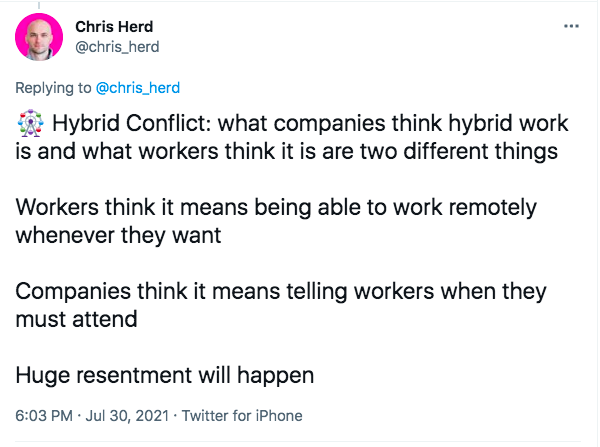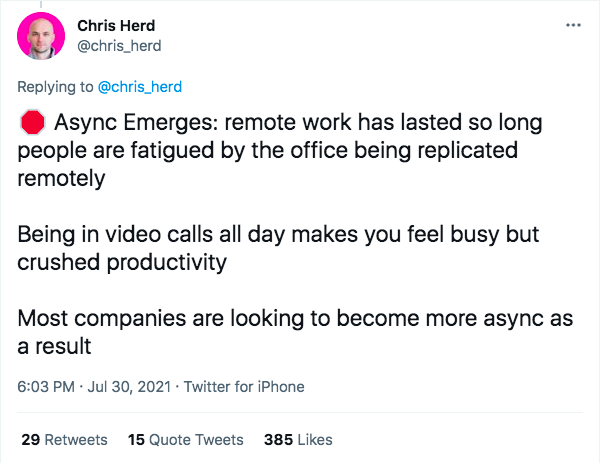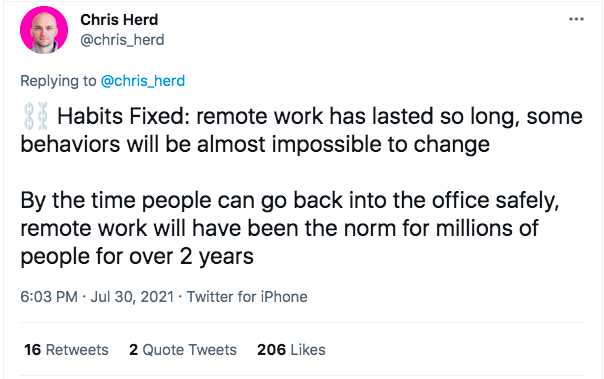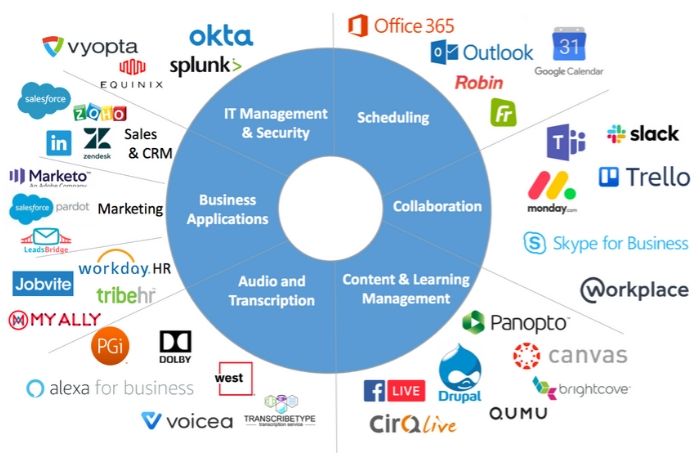The spread of the delta variant of Covid-19 throughout the U.S. has thrown off many predictions about a continued return to normal gatherings and business dealings. The Wall Street Journal recently took a look at how the new surge in infections and hospitalizations is affecting plans for corporations like Apple and Facebook to bring their workers back into the office.
There is some forecasting based on the duration of delta surges in other parts of the world that the U.S. surge could be near its peak, with a loose consensus that infection numbers could start to fall off by early September.
That timing is putting a bit of a bump in the ongoing move to hybrid work that is becoming the new workplace reality. As the name suggests, hybrid work is mix of remote work and bringing employees back into offices that have been mostly abandoned since spring 2020 when the Covid-19 pandemic first began.
Vyopta’s new ebook on hybrid work looks at the different scenarios involved, with a mix of remote work remaining in place and gradually employees coming back into offices on a limited basis a few days a week.
In many cases those in-office days are being scheduled around enabling specific teams or work groups to be able to collaborate more easily. That clustered approach helps to promote social distancing – since fewer people are in the office at one time – and reduces employee exposure to possible infection by bringing them into contact with fewer people
Looking At The Rise Of Hotel Desking
One of the main components of many hybrid work strategies for companies is some form of “hotel” desking that does away with the tradition of permanently assigned desks and cubicles, in favor of making workstations open to all via reservation or on a first-come-first-served basis. The benefits of this kind of an arrangement include keeping work areas free of clutter where bacteria and contaminants can accumulate, with a rigorous cleaning schedule used to keep them sanitized and safe for all to use.
The national Business Journals publication talked to workplace experts and business owners about the practice, which can also play into the larger movement to re-examine how much overall office space companies will use as the move to hybrid work continues.
Their report advises that real estate considerations shouldn’t be the main driver behind hoteling, though it can fall into the larger evaluation of how space will be used overall going forward. Vyopta’s recent ebook on hybrid work discusses how the future use of meeting rooms and traditionally large gathering spaces will play into the layout and footprints of offices for years to come.
Other findings: surveys about hoteling show employees generally split into thirds between groups who don’t care about having their own desks, those who say they need to have a permanently assigned space, and a last group that would like assigned spaces but don’t consider it a necessity.
There was also consideration given to the technological needs associated with hoteling and hybrid work, which lines up with accounts we’ve seen that many more desktop video endpoints will have to be available to accommodate online meetings between those who may simultaneously be in the office.
Predictions On Hybrid Work And The Delta Variant
On Twitter, FirstBase HQ CEO Chris Herd shares some business predictions based on the impact of the delta variant. As the leader of a company focused on enabling and equipping remote workers, Herd certainly has an interest in remote work as an ongoing business concern.
Still, it seems like he’ll be on the mark with several of these predictions, like the difference in opinions between managers and employees about what form hybrid work will take.



Different industries are also taking noticeably varying stances on how they’re handling the return to the office, with banking, financial services and financial technology companies pushing the hardest to get their people back into offices and in meetings with clients. Vyopta founder and CEO Alfredo Ramirez said the technology required to execute most of those jobs successfully make home offices less than ideal.
“Financial services and fintech is counter to a lot of the rest of the tech industry in general. They’re starting to force people to work there as they require people to return back to the office. Places like Goldman Sachs, Morgan Stanley, and JP Morgan have taken really strong positions, saying we’ll get back to the office,” he said.
“It’s not the entire organization, but it’s people like their traders because they’ve got to have instantaneous actions, where when they press the ‘trade’ button it’s got to in fast. If you’re at home and your ISD goes down or your Wi-Fi is not working, they can’t afford those mistakes. Investment banking, prime wealth management set are some others… a lot of businesses have people in roles that are mission critical or that they have to be at the office.”
Get all the latest info about hybrid work in our new ebook.
Chad Swiatecki is a business writer and journalist whose work has appeared in Rolling Stone, Billboard, New York Daily News, Austin Business Journal, Austin American-Statesman and many other print and online publications. He lives in Austin, Texas and is a graduate of Michigan State University. Find him online on LinkedIn.








